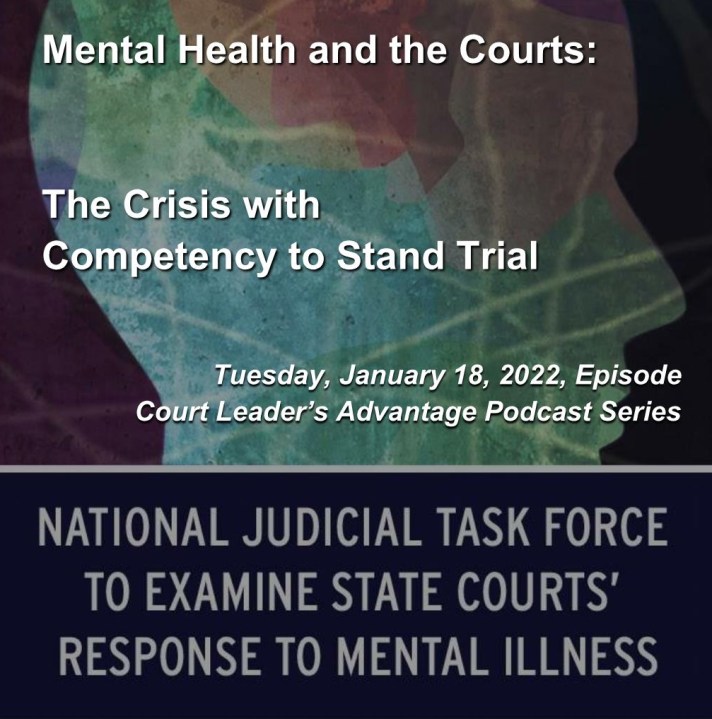Court Leader’s Advantage Podcast Episode: January 18, 2022

Brought to You in Cooperation with NACM

In November we started our discussion on how mental illness is impacting our nation
and particularly our courts. In this episode, we are taking a deeper dive into the criminal justice realm, specifically the challenge of competency to stand trial. The task of determining if a defendant is competent to stand trial, to assist in one’s own defense can be daunting. The road to restoring a defendant to competency can be arduous and leave some people in an incarcerated limbo for weeks or even months.
This month is the second of our five-episode discussion with members of the National Judicial Task Force to Examine State Courts’ Response to Mental Illness. Some of the questions we will explore include:
- What are some of the specific challenges surrounding competency to stand trial?
- What is being done to overcome those challenges on both the national and the community level? and
- What recommendations does the Task Force have for us?
Listen to the January 18, 2022 CLAPodcast Episode on your way to or from work. 33 Minutes 25 Seconds
Watch the January 18, 2022, CLAPodcast Episode 35 Minutes 12 Seconds
Today’s Panelists

The Honorable Nan Waller was appointed to the Multnomah County Circuit Court bench in 2001 by Governor Kitzhaber. She served as the Chief Family Law Judge for 5 years and as Presiding Judge for 6 years. She currently is the Mental Health Court Judge and manages the Aid and Assist docket for the court.
Judge Waller was appointed to the Multnomah County Circuit Court bench in 2001 by Governor Kitzhaber. She served as the Chief Family Law Judge for 5 years and as Presiding Judge for 6 years. She currently is the Mental Health Court Judge and manages the Aid and Assist docket for the court.
Judge Waller received her BA from Stanford University and graduated from the University of Oregon School of Law.

Richard Schwermer has been involved in all aspects of court administration for over 30 years. First as a state level trial court administrator, then as a legislative liaison and Assistant State Court Administrator, he retired as the Utah State Court Administrator in 2019.
From 1994 to 2016 he was responsible for representing the judiciary to the legislative and executive branches of government and reviewing and drafting court related legislation.
Rick is committed to translating research into effective evidence-based practices in a variety of contexts, including court case management, behavioral health issues in the courts, pre-trial reform, and problem-solving courts.
He now serves as a consultant and faculty for the National Center for State Courts and for the National Association of Drug Court Professionals.
He earned a BA from Colby College in Waterville, Maine, and a Juris Doctorate from the SJ Quinney School of Law at the University of Utah.
Do You Want to Learn More?
Leading Reform: Competence to Stand Trial Systems
Leading Reform: Court and Community Diversion
Collaborative Court and Community Caseflow Management
Just and Well October 27, 2020, Issue
Oregon’s Aid and Assist Dashboard
The Sequential Intercept Model: Decriminalizing Mental Illness
When Mental Illness Becomes a Jail Sentence
Judicial Summit on Mental Health

Hi Peter
I watched the Podcast on fitness issues today. Very well done. Nan Waller is by far the most knowledgeable judge in Oregon on this issue, due largely to the volume and variety of cases of this nature she hears in Portland.
I thought I would let you know there is some litigation in Oregon around one aspect of this issue of which I doubt Judge Waller is aware. I am the lead plaintiff in a habeas corpus case against the State Hospital that contends that the Oregon State Hospital has no authority to take and treat criminal defendants from municipal courts who have been found unfit to proceed. The case is now in the Oregon Court of Appeals. This is no small issue as between 2018 and 2021, the municipal court in Eugene sent about 80 such defendants to the hospital.
I sort of stumbled into this issue back in 2008, about 13 years after I had retired from the bench. I had been working as a consultant in the area of court reforms related to court and case management and the introduction of technology, both in the United States and in numerous developing countries.
In 2008 I was contacted by the Oregon Governor and asked to work for him as his “Special Master”, to be his representative to the major transformation project that was just beginning at the Oregon State Hospital, which eventually led to the construction of a new hospital and total transformation of the treatment protocols followed by the hospital.
During my time as Special Master, I discovered, to my surprise, that municipal courts around the state were sending criminal defendants to the Hospital as unfit to proceed. Those municipal defendants made up approximately 10% of that population. Not a large number as such, but significant in that the Hospital was bursting at the seams. At that point, it was just a gut instinct that these courts had no jurisdiction to use the hospital and that the hospital had jurisdiction to take and treat these people.
After considerable research I found a case that confirmed by suspicion that municipal courts did not have authority to use the Hospital. What followed was a tug of war with the Attorney General’s office over this issue. A long story short, they finally conceded that I was correct and made the Hospital discharge all the municipal court defendants.
In 2019 I stumbled upon the fact that the Hospital was once again taking fitness defendants from municipal courts. This time, the AG’s office refused to acknowledge the unlawfulness of such commitments, and I filed the habeas corpus proceeding on behalf of several municipal court defendants. It is my guess that it will be at least Fall before the appeals court gets around to resolving this matter.
Jim
“I came into the world to live out loud” Emile Zola
LikeLike
Dear Judge Hargreaves,
I was not aware of your litigation on Municipal Courts not having the authority to send defendants to the Oregon State Hospital and would love to read any material that you can share.
All the best,
Nan G. Waller Multnomah County Circuit Court Judge 1200 SW 1st Ave. Portland, OR 97204 (971) 274-0622
From: Jim Hargreaves Sent: Thursday, January 20, 2022 2:12 PM To: Court Leader Cc: Nan Waller Subject: Re: [New post] Mental Health and the Courts: The Crisis with Competency to Stand Trial
You don’t often get email from jrhdks@gmail.com. Learn why this is important Hi Peter I watched the Podcast on fitness issues today. Very well done. Nan Waller is by far the most knowledgeable judge in Oregon on this issue, due largely to the volume and variety of cases of this nature she hears in Portland.
I thought I would let you know there is some litigation in Oregon around one aspect of this issue of which I doubt Judge Waller is aware. I am the lead plaintiff in a habeas corpus case against the State Hospital that contends that the Oregon State Hospital has no authority to take and treat criminal defendants from municipal courts who have been found unfit to proceed. The case is now in the Oregon Court of Appeals. This is no small issue as between 2018 and 2021, the municipal court in Eugene sent about 80 such defendants to the hospital.
I sort of stumbled into this issue back in 2008, about 13 years after I had retired from the bench. I had been working as a consultant in the area of court reforms related to court and case management and the introduction of technology, both in the United States and in numerous developing countries.
In 2008 I was contacted by the Oregon Governor and asked to work for him as his “Special Master”, to be his representative to the major transformation project that was just beginning at the Oregon State Hospital, which eventually led to the construction of a new hospital and total transformation of the treatment protocols followed by the hospital.
During my time as Special Master, I discovered, to my surprise, that municipal courts around the state were sending criminal defendants to the Hospital as unfit to proceed. Those municipal defendants made up approximately 10% of that population. Not a large number as such, but significant in that the Hospital was bursting at the seams. At that point, it was just a gut instinct that these courts had no jurisdiction to use the hospital and that the hospital had jurisdiction to take and treat these people.
After considerable research I found a case that confirmed by suspicion that municipal courts did not have authority to use the Hospital. What followed was a tug of war with the Attorney General’s office over this issue. A long story short, they finally conceded that I was correct and made the Hospital discharge all the municipal court defendants.
In 2019 I stumbled upon the fact that the Hospital was once again taking fitness defendants from municipal courts. This time, the AG’s office refused to acknowledge the unlawfulness of such commitments, and I filed the habeas corpus proceeding on behalf of several municipal court defendants. It is my guess that it will be at least Fall before the appeals court gets around to resolving this matter.
Jim
“I came into the world to live out loud” Emile Zola
LikeLike